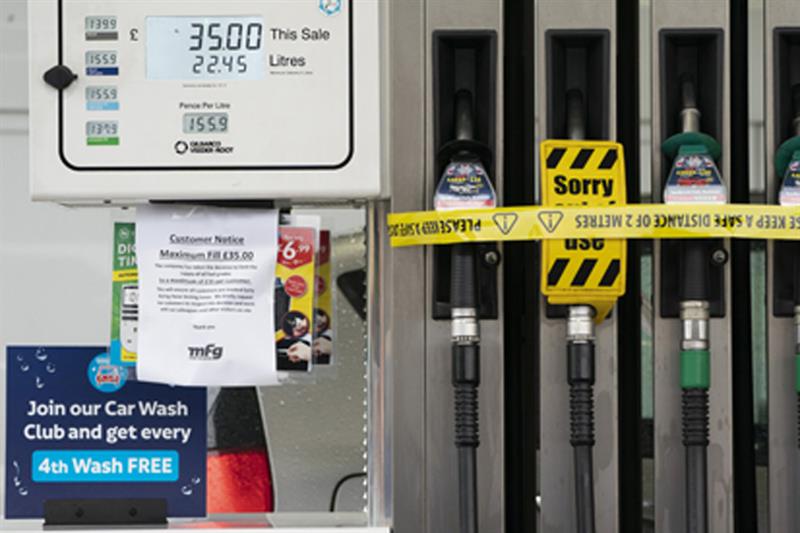
Closed pumps at a petrol station in Manchester, England (photos: AP)
Energy contract traders are making ample profits. Even equity investors are enjoying the spike in the share prices of major oil companies, which averaged more than 15 per cent in the last few days. Meanwhile, industries and consumers are facing rapid and huge rises in energy bills.
For the first time since the autumn of 2018, crude oil prices came close to $80 a barrel last week; and natural gas prices more than trebled in Europe since start of August. That forced some countries to revert to coal-fired power stations to make up for the shortage in their electricity grids. The UK, Germany and other countries had to switch on power stations that were supposed to be decommissioned to achieve global warming combatting targets.
But officials in energy-consuming countries, for once, are not blaming Gulf oil and gas producers for the current price spike. The reasons for the price increase are rather a drop in supply due to accumulated shortages in the year of the pandemic and the need to refill energy stores depleted during lockdowns.
Some political manoeuvring cannot be avoided anyway, with the US and Europe accusing Russia of turning off gas taps to Europe. China has also been blamed for the huge increase in Asian energy imports. The latest is part of the imbalance in the demand-and-supply equation of energy market supporting price hikes.
At least, Gulf exporters and the Organisation of Oil Exporting Countries (OPEC) escaped blame this time. Previously, any energy price spike was quickly and easily blamed on OPEC and the Gulf Cooperation Countries (GCC) in particular as a soft target.
An Oxford-based energy analyst told Al- Ahram Weekly that the increase in oil prices also helps replenish the treasury coffers of Gulf states following the pandemic. According to official figures from the Energy Information Agency of the US, an annual average of 21 million barrels per day (bpd) of oil went through the Strait of Hormuz in 2018. That includes some Iraqi and Iranian oil, besides the exports of the GCC countries. Re-routing some of the production and the cuts applied by OPEC, the estimate now is around 18 million bpd.
“For those who set their budget estimates around $60-65 per barrel, the latest price rise means a surplus of around $2 billion a week for those countries. This is true if we consider oil Gulf exports without even mentioning natural gas exports, especially from Qatar,” the analyst said.
Demands on energy have increased rapidly this year as economies around the world started to grow, recovering from the pandemic. Under investment in oil and gas production in the last few years was reflected in a supply squeeze. Clean energy trends and investment in producing energy from sustainable resources like the sun and wind is growing but not yet enough to provide a major portion of global needs.
For example, this summer wind turbines in the northern hemisphere stopped due to still winds associated with the rise of temperatures. That was also another reason added to increased gas prices leading to coal power stations providing between 15 and 20 per cent of power.
In recent years GCC countries have been investing in clean energy while providing the global economy with the fossil fuels needed to keep it running and growing. The UAE already operates two nuclear power stations, and another two are coming soon. Saudi Arabia is planning to build its first nuclear power station. Abu Dhabi also pioneered the solar energy sector by establishing Masdar, a clean energy arm of the investment fund Mubadala, earlier this century.
Decades ago, the Gulf countries would have used billions of dollars of revenue from oil and gas price increases for heavy spending. Now, as these countries are diversifying their economy away from heavy reliance on oil and gas revenues, they are becoming more conservative in their spending. The new focus is riding the new wave of a green and smart economy strategically important for GCC countries.
With oil and gas destined to remain a principal source of power for the global economy for many years to come, those countries can use the revenue from exports to reinvest in sustainable development, as one Dubai-based commentator puts it. Billions of dollars might be pouring into oil and gas exporters’ pockets, but now they are more aware than before that it is an unsustainable source of income. Investing in other sectors of the economy is a guarantee for the future, as the commentator notes.
Ambitious plans and projects to diversify the Gulf economies needed finance not as forthcoming as it might be in the year of the pandemic. Now, if this spike in energy prices continues, it may help plug the finance gap for those plans.
*A version of this article appears in print in the 30 September, 2021 edition of Al-Ahram Weekly
Short link: